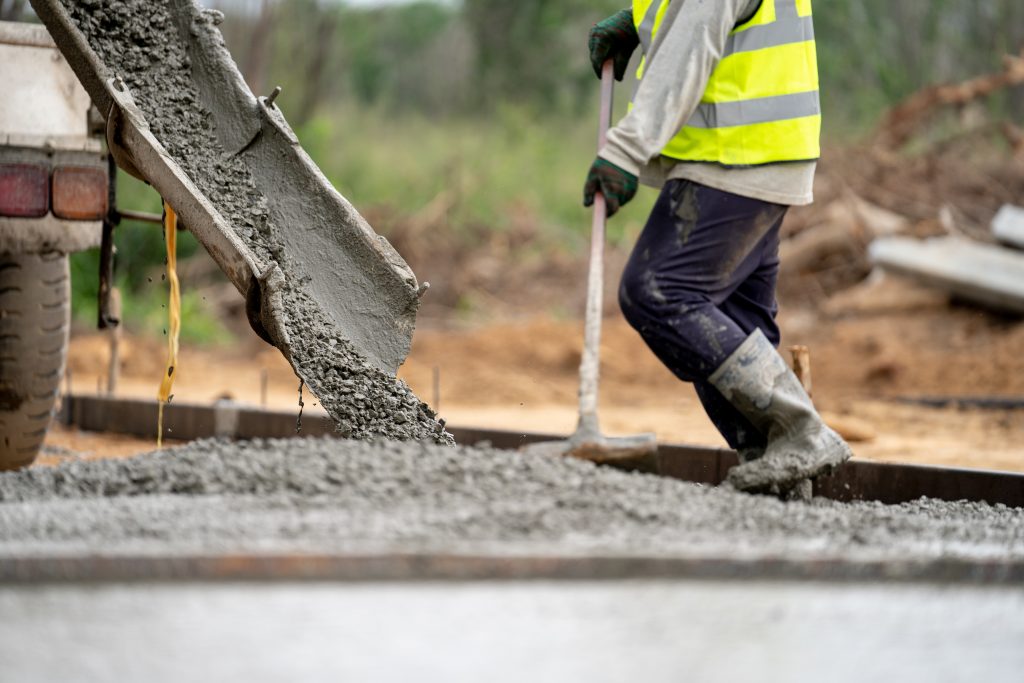Which is the Best Cement for Concrete Mix?

Every construction project, whether it is a towering skyscraper or a simple house project, uses concrete as a construction material. Further, concrete uses raw materials like cement, aggregates and water in its mix. The quality of materials used in the concrete mixing stage impacts the concrete’s strength and durability. Here, you can get information on the type of cement that works best for concrete.
Cement Selection for Concrete Construction
Concrete construction is primarily defined by the type and quality of cement used. Cement holds the foundation of your structure together. It reacts with water to bind together sand and gravel or crushed stones to form a sturdy mass called concrete, which also is the backbone of every construction project.
As per the Indian Standard (IS), you can use various types of cement for mixing concrete. Your cement selection should align with the nature and scale of the project. Each type of cement has distinct characteristics and understanding these characteristics aids in picking the appropriate cement. Whether you are moulding elaborate architectural elements or constructing solid concrete roadways or bridges, the kind of cement used should match the purpose, functionality and endurance required by the structure.
Types of Cement Used for Concrete
Depending on the construction requirements, any of the following can be the best cement for concrete:
Ordinary Portland Cement (OPC):
When Portland clinker is intimately ground with gypsum, the result is OPC. OPC can be of three grades, OPC 33, OPC 43 and OPC 53. The numbers 33, 43 and 53 represent the corresponding compressive strengths. Each grade of OPC is used for different types of construction projects.
Portland Pozzolana Cement (PPC):
PPC is produced by grinding Portland cement clinker with fly-ash-based or calcined-clay-based pozzolanic particles. PPC can be used for general, marine and hydraulic construction purposes.
Portland Slag Cement (PSC):
PSC is produced by grinding Portland cement clinker with granulated blast furnace slag and is best suited for marine works.
Rapid Hardening Portland Cement:
This type of cement achieves high strength in less time. It is typically used in construction projects where water exposure is high.
Hydrophobic Cement:
Hydrophobic cement is obtained by grinding Portland cement clinker with hydrophobic agents like oleic acid, naphthenic acid, stearic acid, pentachlorophenol, etc. This cement deteriorates extremely slowly when used in unfavourable conditions for prolonged periods.
Low Heat Portland Cement:
This type of cement, when mixed to create concrete that produces low heat of hydration as the setting and hardening of cement takes place.
Sulphate-Resisting Portland Cement:
This type of cement is used in areas where the concrete is susceptible to sulphate damage.
Key Considerations in Cement Selection
Choosing the right cement for concrete is imperative in a construction project. Here are some key factors to keep in mind while making this decision.
Purpose of the Concrete
The intended use of the concrete fundamentally determines the cement type and quantity required. For instance, load-bearing structures typically require high-strength concrete with a concrete mix of one part cement, two parts fine aggregate and four parts coarse aggregate. On the other hand, concrete for culvert beds and foundations can be made using ordinary cement that is reinforced with steel bars.
Particle Size Distribution
The final strength and density of the concrete depend significantly on the distribution of particle sizes in the mix. The varying sizes of fine aggregates (like sand) and coarse aggregates (like gravel) result in dense and robust concrete. Usually, the coarse aggregates form the skeleton of the concrete, thus providing compression strength. The fine aggregates fill empty spaces between these large particles, while the cement paste fills the tiniest spaces. This effectively binds the particles together.
Quality of Cement
Over time, cement can deteriorate, thus resulting in a reduction of concrete strength. Therefore, cement should ideally be purchased just before its intended use, with preference given to older stock to maximise quality. The composition of cement significantly affects the final properties of concrete.
Simplifying Cement Choice: Ensuring Strong and Reliable Concrete Construction
Given the multitude of cement options, choosing the ideal one might seem daunting. At JK Cement, we simplify this for you by offering specific cement variants that cater to unique construction demands. Whether it’s our JK Super Cement for general-purpose structures or our specialised JK Super Strong for high-end infrastructure needing greater strength, we have got you covered. Each of our cement products offers a well-balanced equilibrium of strength, durability and resilience.
FAQs
Which is the best cement for concrete?
The ‘best’ concrete cement varies with the project’s specific requirements like purpose, environmental conditions, timeline and cost-operation.
What are the factors that you should consider before selecting your choice of cement?
The quality and particle size distribution of cement are the major factors that you should consider before choosing your choice of cement.
Where is OPC suitable?
Ordinary Portland Cement (OPC) is suitable for general-purpose structures and areas needing fast formwork removal due to its high initial strength rate.
In which cases is PPC recommended?
For large-scale infrastructure and harsh environments, Portland Pozzolana Cement (PPC) is recommended for its high final strength and improved resistance to chemical attack.
Which cement hards rapidly?
If you require quick hardening (in case of cold weather conditions or tight project timelines) choose Rapid Hardening Cement.